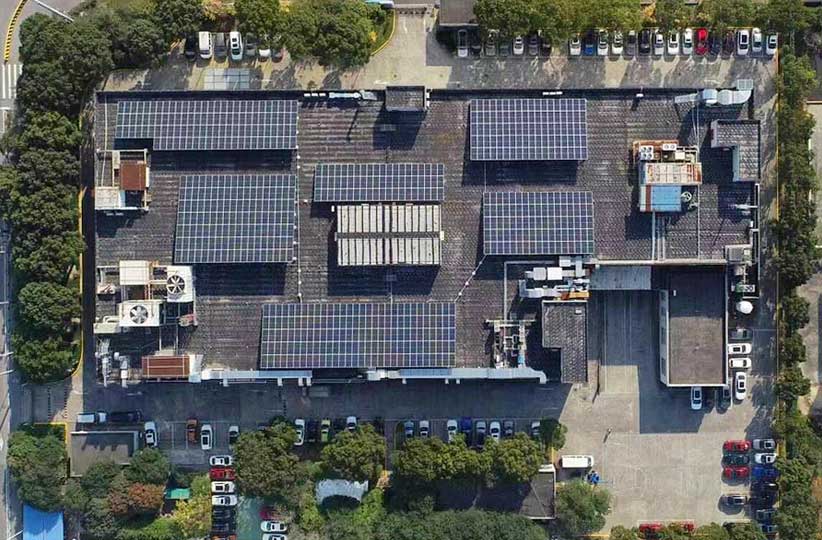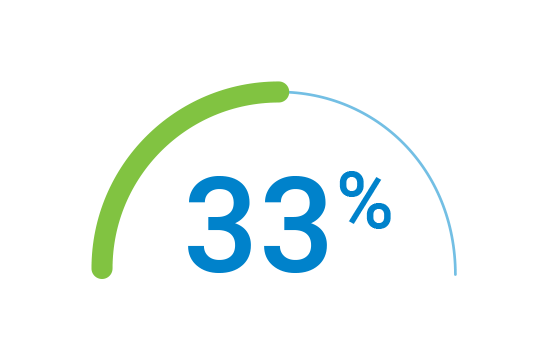Driving sustainability since day one
 Solar Power System at Agilent Technologies Shanghai
Solar Power System at Agilent Technologies Shanghai Since Agilent's founding over two decades ago, we have consistently addressed sustainability issues and reported on our progress. We are now expanding those efforts by committing to net-zero greenhouse gas emissions with interim targets aligned with the Paris Agreement.
How our strategy has evolved
Our net-zero commitment includes the products we make, how we work with customers and suppliers, how we manage our internal operations, and being accountable for achieving our goals. In short, it includes everything we do.
We're investing more in renewable energy in our sites and facilities, moving our car fleets from gas to electric, and reducing business travel. We're also exploring moving more freight via sea or even rail, and engaging with our supply chain to identify which suppliers have the largest carbon footprint, working with those suppliers to reduce emissions, and factoring carbon footprint into supplier selection decisions.
Companies seeking to reduce emissions should align and measure their efforts in three distinct areas, known as "scopes" of activities. Below we list our scopes and the areas they impact.
Scope
Focus Area
Goal:
Reduce 50% by 2030
Scope 1:
Direct emissions from Agilent-owned or controlled sources
Site Operations
Including fuel combustion on site such as gas boilers, fleet vehicles and air-conditioning leaks.
Scope 2:
Indirect emissions from electricity purchased or used by Agilent
Site Energy Consumption
Goal:
Reduce 30% by 2030
Scope 3:
Indirect emissions from our value chain, occurring from sources we do not own or control. These are the greatest share of our carbon footprint.
Car Fleet
Site Waste
Business Travel
Employee Commuting
Sold Products/End-of-life Treatment
Leased Offices
Logistics
Purchased Goods & Services; Capital Goods
Goal: Net-zero emissions by 2050
How We Measure and Validate Our Progress
We’re measuring our progress toward our net-zero goals with interim targets in accordance with the Greenhouse Gas Protocol, a comprehensive global standardized framework to measure and manage greenhouse gas emissions. Our goals and targets have been approved by the Science Based Targets initiative. Disclosures on our progress are verified annually by S&P Global Sustainable 1, an independent third party.
View Agilent’s Environmental Data and Assurance Statement. Learn more at Environmental Health and Safety.
Our recent progress
Greener Energy Practices
Since 2014, we've reduced carbon dioxide emissions 33% per square foot, even as our operations have grown.

We achieved this by:
- Introducing solar energy, generating over 6.7 MWh of renewable energy and offsetting nearly 3,000 metric tons of carbon dioxide emissions each year. This includes installing solar arrays in large sites in the United States, Australia and Singapore. In addition, we recently built a solar photovoltaic power station on the roof of our manufacturing facility in Shanghai, China. This project has reduced emissions by over 245 metric tons of carbon dioxide each year.
- Reducing kilowatt hours 7% (per square foot) and energy consumption 12% (per dollar of annual revenue) by installing more efficient lighting and system controls.
Through our Design for the Environment initiative, we've created award-winning products that use less energy, water and space.

Examples include:
- The Intuvo 9000 gas chromatograph, which uses less than half the electrical power of a conventional GC.
- The 4210 MP-AES atomic emission spectrometer, which runs on air instead of combustible gases.
- Sustainable vacuum products, including scroll pumps that use oil-free technology and refurbishing services that reduce waste and encourage reuse.
Additionally, we're among the first companies in our class to be independently audited for the environmental impact of our gas and liquid chromatographs. And we're working with an independent nonprofit called My Green Lab to have Agilent instruments independently audited for the organization's Accountability, Consistency, and Transparency (ACT) label, which provides customers information about the environmental impact of lab products. See the full list of ACT-labeled Agilent products.
In 2022, we reduced our emissions from logistics by 7,706 metric tons by working with suppliers to deliver more products by sea instead of by air.

To switch from rapid product delivery via air to monthly shipments by ocean requires thinking big—specifically, reinventing how we manage global inventory. What began as a pilot project has now expanded to include more than 20 suppliers and transit from our factories to our logistic centers. Our learnings from this initiative continue to inform strategies that reduce emissions while ensuring products are delivered safely and efficiently.
Accelerating our commitment
See how our commitment has evolved over 20 years-from our first sustainability report to our commitment to net-zero emissions.
2000
Submitted our first sustainability report on energy, waste, water and CO2 emissions – a tradition we've upheld every year since our founding.
2004
Adopted the Global Reporting Initiative (GRI) guidelines, reduced energy usage by 6.3% year over year, and made significant progress toward tracking and eliminating hazardous materials from our products.
2008
Expanded our reliance on solar power, generating over 1MW of clean, renewable energy and continued to reduce our energy usage.
2016
Established a global, cross-functional Sustainability Council to increase sustainability focus, participation and communication
2020
Adopted Sustainability Accounting Standards Board (SASB) recommendations in our GRI report, which cover environmental, social and governance metrics.
Published results of our second Materiality Assessment, based on learnings from internal and external stakeholders as well as data from Dow Jones Sustainability Index, CDP and green energy surveys.
2021
Adopting the Task Force on Climate-related Financial Disclosures (TCFD) recommendations for disclosing climate-related risks alongside our SASB and GRI reporting.
Committed to achieving net-zero greenhouse gas emissions by 2050
2022
Developed and began implementing a plan to engage suppliers on scope 3 emissions.
2023
Achieved validation of our net-zero emissions targets from the Science Based Targets initiative in accordance with the actions needed to limit warming to 1.5°C above pre-industrial levels.
Others have taken notice

Top Product award for our Certified-Preowned Instruments Program, a circular economy initiative.

Seal Award for our innovative products that help customers achieve their environmental goals.

IBD’s 100 Best ESG Companies in 2022 for our strong financial and sustainability performance.

Ranked in the top 20 of Barron’s 100 Most Sustainable Companies for six consecutive years.